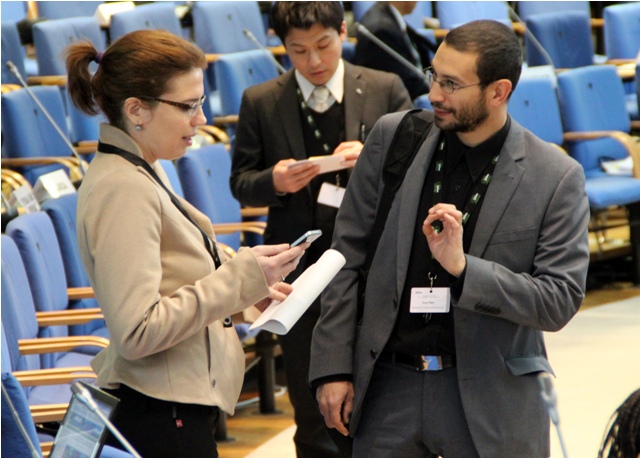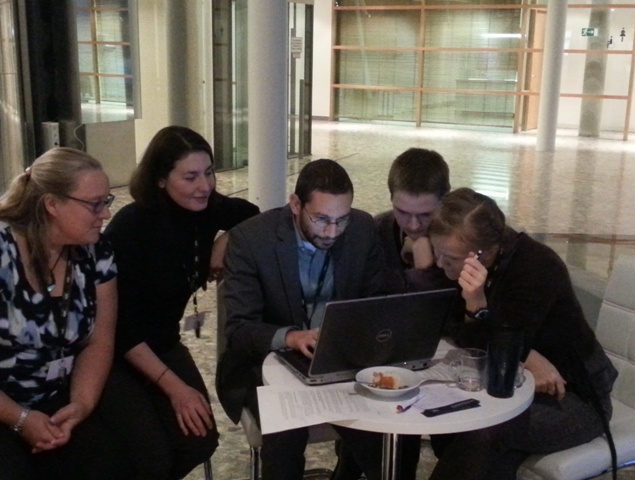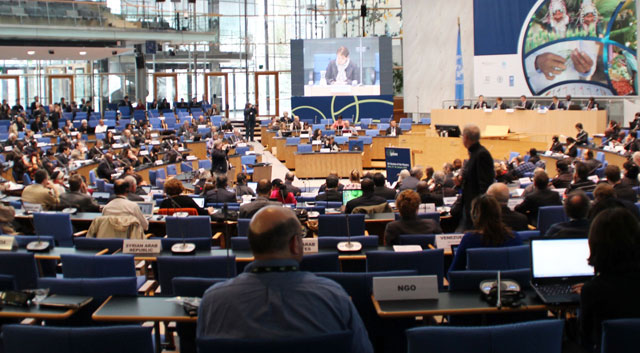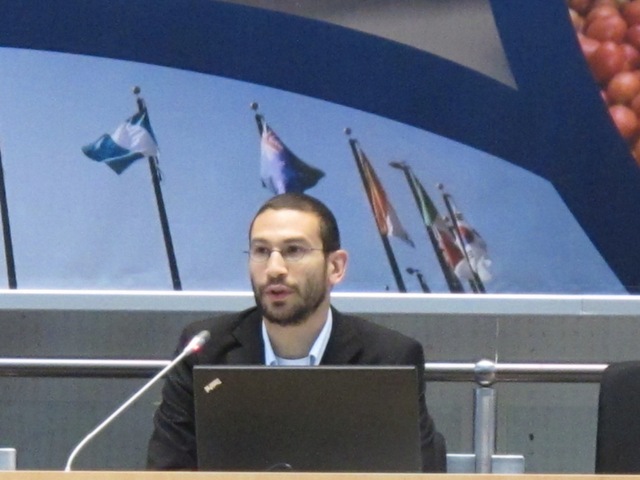The 26th of January 2013 can be marked as an historical day: IPBES has finally been officially launched. It has a Bureau, it has a Multidisciplinary Expert Panel comprising 25 excellent scientists from across the world, and now, after a long process, its Bureau also has a Chair: M. Zakri, Science Advisor to the Prime Minister of Malaysia and Chairman of the Malaysian Professors’ Council.
 |
| SCB IPBES Delegate Guy Pe'er speaks with a colleague at IPBES in Bonn, Germany. Photo from IISD Reporting Services |
From the perspective of the stakeholders, it is worthy to point out two additional achievements: First of all, 78 organizations have already been admitted to IPBES as official observers, a number which is higher than ever admitted to the IPCC. This is not at all an insignificant difference given that the success of IPBES will truly depend on a broad range of contributions from across the world and throughout its work.
The second related achievement is the initiation of a process to develop a Stakeholder Engagement Strategy, to be supported by the International Council for Science (ICSU) and the International Union for Conservation of Nature (IUCN). How IPBES intends to support this process, however, is not yet clear.
 |
| Members of SCB's IPBES Delegation including Carolyn Lundquist (left) & Guy Pe'er (center) huddle with other Stakeholders on day three of IPBES |
These achievements are well-summarized by the very positive statement made by IUCN in the name of the stakeholders at the closing session.
First of all, the question of how to admit future observers to IPBES remains open, and demands were repeatedly made to do so only under consensus. This means that some stakeholders may have serious difficulties in becoming observers. This might not sound like a major problem for those who support IPBES from the first place, for environmentalists may always remain welcome, but it may pose challenges when wanting to achieve transparency and a broad societal acceptance. Thus, a political question of how to include or exclude observers could later on become a barrier when trying to use the recommendations made by IPBES in reconciling the conflicts between humans and nature.
The experience of the IPCC may serve in demonstrating how high the price of such resistance may be: While I strongly believe that scientific excellence has guided the development of IPCC assessments and recommendations, we should warily note the various accusations as if IPCC assessments are dominated by political and economic interests. Hopefully, greater transparency and an effective inclusion of stakeholders in the IPBES process, including some which may not be welcome at first sight, may lead to greater societal acceptance and overall cooperation.
 |
| IPBES delegates find time for a nap on day three of IPBES in Bonn, Germany |
A second challenge relates to the work of the MEP: It is now that a group of 25 excellent scientists will have to start scanning through a pile of environmental crises and ask themselves which ones are most urgent and relevant.. I do not envy the members of the MEP (Sorry, András Báldi, President of SCB’s Europe Section), for the poor representation of some disciplines – especially among the social sciences (there are enough conservation ecologists, of course) – may put hurdles on the selection process when touching realms of science that members of the first MEP may lack.
Thus, if we want to contribute to the success of IPBES, perhaps the starting point should be to assist the MEP by making constructive suggestions for cooperation between the MEP and potential contributors of knowledge and experience. Likewise, the MEP might be able to still shape the work of IPBES if it develops, for instance, a procedure for inviting experts from the outside (primarily to compensate for disciplinary biases), but at the same time help in addressing the question whether observers of any kind should be allowed to the meetings of the MEP. In other words, the MEP could enhance stakeholder involvement by forming active cooperation on the ground and paving the route for both sides (that is, both stakeholders and IPBES) in identifying means of effective and productive cooperation.
Now, at this point, I would like to shift from a reporting tone to a more personal one, and play a little bit with ideas. Having seen the impact of political processes on the process of building IPBES, I am wondering what would happen if a request for assessment touches the country of origin, say, of the distinguished Chair of the Bureau: Malaysia.
 |
| A view of the IPBES Plenary. Photo from IISD Reporting Services |
Malaysia, in my opinion, could serve as one of the most fascinating case studies for the local manifestation of global pressures. With one of the most diverse fauna and flora in the world, it also suffers from one of the highest current rates of deforestation, primarily due to the expansion of palm-oil plantation –for consumption in China, India, Europe (biofuel!) and many others. All in all, it produces over 40 percent of the world’s palm-oil, in response to rocketing global demands. Malaysia is also one of the most important hubs for the wildlife trade, which surely does not contribute to securing biodiversity. Interestingly enough, this trade is facilitated by European markets, such as the pet trade, and rumours say that one of the leading countries here is… Germany: Home of the IPBES Secretariat.
I thus wish to make my humble request: would the MEP be interested in such case studies, and seek to identify and engage relevant stakeholders in assessing how intricate global linkages act? Can we take such case studies to investigate what societal and economic changes are needed in order to provide solutions on the consumers’ side? In other words, what can we do to enhance global responsibility and replace the current belief that technology is the mother of all solutions?
 |
| Guy Pe'er, a member of SCB's IPBES Delegation, at an IPBES Stakholders meeting in Bonn, Germany |
This is just a small idea, of course, to express my more general wish to see a systematic coverage of drivers and pressures, rather than regional balance, in the work of the MEP and its assessments.
At any rate, I would like to end with an even more personal note: I would like to wish IPBES, and more specifically the MEP, Bureau and the secretariat the best of luck: I truly hope that this body will be able to mark a route out of current trends.
**Disclaimer: This blog entry reflects a personal account of IPBES from SCB IPBES Delegate Guy Pe'er and does not necessarily reflect the views of SCB
Blog Posts from SCB's IPBES Delegation
- IPBES Day Five
- IPBES Day Four
- IPBES Day Three
- IPBES Day Two
- IPBES Day One
- Stakeholders' Day
- IPBES Needs Support of Learned Societies
- SCB Sends Delegation to IPBES
SCB IPBES Resources
- Former SCB President Tom Lovejoy's Op-Ed on IPBES in the New York Times
- IPBES Stakeholder website (click on Stakeholder tab)
- Stakeholders' Day presentation from Carolyn Lundquist
- Conservation Biology editorial - IPBES: Opportunities and Challenges for SCB and Other Learned Societies
- SCB's IPBES Web page
- SCB Position Statement for the first IPBES plenary
- IPBES Website
- IISD Reporting Services - IPBES